Proper storage of clean cutting boards is essential for maintaining kitchen hygiene and ensuring the longevity of your kitchen tools. Where can you safely store clean cutting boards to prevent contamination and damage? The answer lies in finding a dedicated space that is dry, well-ventilated, and easily accessible. This not only keeps the cut boards in optimal condition but also reduces the risk of cross-contamination with other kitchen utensils. By implementing effective storage solutions, you can maintain a clean and organized kitchen environment, ultimately promoting better food safety and preparation practices.
Why Proper Storage Is Essential?
Proper safely store of clean cutting boards is crucial for maintaining kitchen hygiene and ensuring the longevity of It. It comes into direct contact with various foods, making them potential sites for bacterial growth if not stored correctly. By ensuring they are stored in a clean, dry environment, you prevent cross-contamination and keep your kitchen safe and organized. Proper storage also helps maintain the Finish A Cutting Board Food Safe material integrity, whether it’s wood, plastic, glass, or bamboo.
Importance of Proper Cutting Board Storage
Storing cutting boards correctly is important not only for hygiene but also for functionality and convenience. A well-organized storage system allows for easy access and helps you keep track of which It is used for what purpose, be it meat, vegetables, or bread. This systematic approach reduces the risk of foodborne illnesses and makes your cooking process more efficient and enjoyable.
Types Of Cutting Board
1. Wooden Cutting Board
2. Plastic Cutting Board
3. Glass Cutting Board
4. Bamboo Cutting Board
Storing Wooden Board

Wooden board require specific storage conditions to prevent warping and cracking. Store It vertically in a rack that allows air circulation on all sides. Ensure they are completely dry before storing to avoid mold growth. Keeping them in a cool, dry place will prolong their lifespan and maintain their natural antibacterial properties.
Storing Plastic Board

It are durable and easy to clean, but they also need proper storage to stay sanitary. These boards can be stored in a cabinet or drawer, ideally in a rack that keeps them upright and separated. This arrangement ensures they stay dry and reduces the risk of bacteria harboring in any crevices. It should be completely dry before being put away to prevent mold and mildew.
Storing Glass Board

Glass board, although less porous than wood or plastic, still need careful storage to avoid chips and cracks. Store glass boards in a cushioned or padded rack to prevent damage. They can also be stored vertically or horizontally in a cabinet with dividers. Always ensure they are dry and clean before storing to maintain their non-porous surface.
Storing Bamboo Board

Bamboo cutting boards, like wooden ones, benefit from vertical storage in a well-ventilated area. Bamboo is naturally resistant to bacteria and moisture, but it’s essential to keep these boards dry and in a cool place to avoid warping and cracking. A dedicated rack or a slot in a cabinet is ideal for bamboo boards.
How Often Should I Clean My Cut Board?
Cutting boards should be cleaned thoroughly after each use to prevent contamination. Use hot, soapy water for daily cleaning, and periodically disinfect with a solution of vinegar or diluted bleach. Wooden and bamboo boards can be treated with mineral oil to maintain their surface. Regular cleaning ensures your It remains safe for food preparation.
Can I Store a Cut Board in the Dishwasher?
Plastic and glass board are generally dishwasher safe, making them convenient for thorough cleaning. However, wooden and bamboo boards should not be stored in the dishwasher, as the high heat and moisture can cause damage. For these It, hand washing and proper drying are essential to maintain their integrity.
Conclusion
Safely storing clean cut boards is a vital aspect of kitchen maintenance that promotes hygiene, extends the life of your It, and ensures food safety. Whether you have wooden, plastic, glass, or bamboo board, understanding the specific storage needs of each type helps keep your kitchen organized and your cooking process efficient. Regular cleaning and appropriate storage solutions are key to maintaining a safe and healthy kitchen environment.
